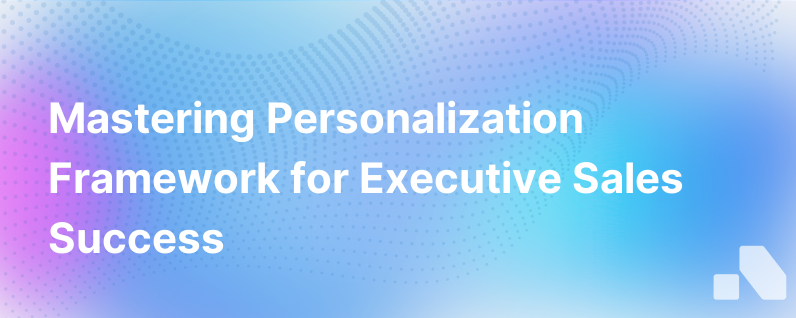Personalization Framework 2
Published on October 8, 2023 by David Zhang
In today's marketplace, personalization isn't just a buzzword, it's a business imperative. With customers bombarded by a myriad of messages daily, delivering generic experiences is akin to being invisible. Here at Aomni, we understand the critical importance of standing out, and personalization is the key.
The development of a Personalization Framework 2.0 is the evolution of marketing strategies that delve deep into humanizing customer experiences at every touchpoint. We're not merely referencing first names in emails—this is about hyper-tailored content that resonates on a profound level. With the right approach, personalization becomes not just a tactic, but a transformative business strategy.
Defining Personalization Framework 2.0
Personalization Framework 2.0 goes beyond simple modifications to include robust, data-driven tactics that tailor experiences to the individual client journey. It leverages advanced technologies, analytics, and creative strategies to deliver dynamic and engaging customer interactions. The framework consists of:
-
Data Acquisition and Integration: Amassing a wealth of customer data from various sources, including CRM databases, website cookies, social media interactions, and IoT devices.
-
Segmentation Models: Using advanced analytics to segment customers not only demographically but also psychographically, which encompasses their behavior, preferences, and purchasing patterns.
-
Predictive Analytics: Harnessing machine learning and AI to predict future behaviors, needs, and desires of customers, enabling anticipatory personalization.
-
Dynamic Content Creation: Creating adaptable content that can be automatically modified in real-time to fit the specific context of each customer interaction.
-
Omnichannel Delivery: Consistent personalization across all channels, whether it be email, website, mobile apps, social media, or in-person engagements.
This evolution of personalization requires rethinking and innovating on all levels of interaction with the customer.
Importance of Personalization Framework 2.0
In a digital-first world, customers expect experiences tailored to their needs. Personalization has profound impacts on customer loyalty, satisfaction, and trust. Here's why a sophisticated personalization strategy matters:
-
Increased Engagement: Personalized content is more engaging and can lead to higher conversion rates and ROI.
-
Brand Differentiation: As competitors crowd the marketplace, a personalized approach helps differentiate your brand and products.
-
Customer Loyalty: Tailored experiences lead to emotional connections, translating into repeat purchases and customer advocacy.
Building Blocks of Personalization Framework 2.0
Let's break down the building blocks necessary to construct a robust Personalization Framework 2.0:
1. Data Collection and Management
A strong foundation for personalization is rich, clean data. You'll need to invest in data collection tools and a centralized data management platform to integrate and sanitize your data. This could involve setting up a Data Management Platform (DMP) or a Customer Data Platform (CDP) to unify customer data into a single, comprehensive view.
2. Segmentation and Customer Profiling
The next step is developing complex segmentation to split your audience into meaningful groups based on behavior, preferences, and more. Machine learning algorithms can reveal hidden segments for deeper targeting.
3. Customer Journey Mapping
Having a clear customer journey map for each segment allows you to understand unique interaction points and how they can be personalized. This map should account for all stages from awareness to advocacy.
4. Predictive Modeling and Decision Engines
Predictive analytics help anticipate a customer's next move. Using decision engines powered by machine learning, you can create if-then scenarios to tailor content dynamically.
5. Content Creation and Management
Automating the personalization process requires investing in tools that help create and manage dynamic content. These might include content management systems (CMSs) and digital asset management (DAM) platforms that integrate with your personalization engine.
6. Omnichannel Integration
Ensure that your personalization efforts are coherent and consistent across all channels. For this, you'll need technology that supports an omnichannel strategy, such as integrated marketing platforms and communication tools.
7. Measurement and Optimization
It's not a set-it-and-forget-it strategy. Continuously measure the performance of your personalized initiatives and employ A/B testing and multivariate testing to optimize over time.
Implementation Strategies
Implementing Personalization Framework 2.0 is an iterative process. Here are some strategies to consider:
- Start small with a single campaign or touchpoint, and gradually expand.
- Focus on high-value segments where personalization efforts can have the biggest impact.
- Get buy-in from stakeholders by showcasing the value and potential impact of personalization on the overall business.
- Continuously evaluate and iterate based on performance data.
Ethical Considerations
Personalization runs on data, which necessitates navigating privacy concerns. Transparent data usage policies and an opt-in approach are paramount. Respect customer privacy by adhering to regulations like GDPR, CCPA, and others.
Personalization with Aomni
At Aomni, personalization is a journey we help you navigate. Our AI-driven tools anticipate the needs of B2B sales and provide appropriate solutions seamlessly. We understand the complexity of the B2B landscape and help translate that into a customer experience that feels both personalized and engaging.
Assembling a Personalization Framework 2.0 is not without its challenges, but with the right data, technology, strategy, and commitment, the goal of truly personalized customer experiences is within reach. The evolution from Personalization 1.0 to 2.0 promises to unlock unprecedented levels of customer engagement and accelerate business growth for those who embrace it.